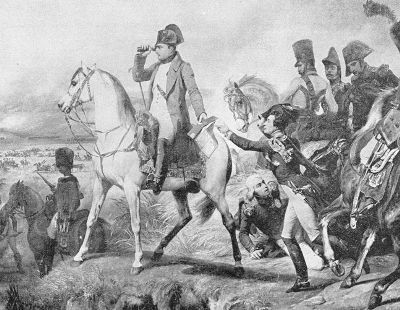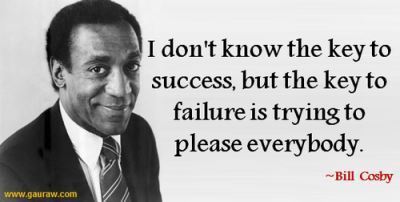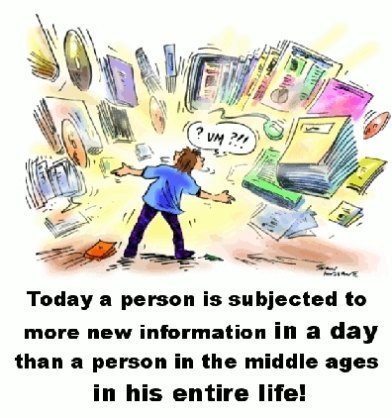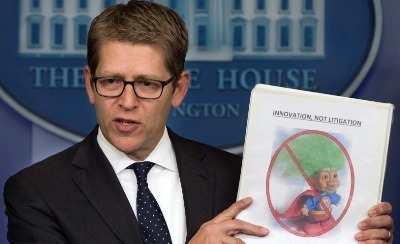Jeremie Averous's Blog, page 133
July 18, 2013
How Flexibility is Essential in Confronting Uncertainty
It is amazing how the military problem of winning battle is close to the problems we face in our daily activities. Contrary to what most people think, successful armies are war are not organizations that are strictly centralized and hierarchical and wait for detailed orders to act.

Napoleon, a leader of the Collaborative Age? His behavior in battle was deeply delegative and collaborative!
History has shown repeatedly that battle is a case of unpredictability, where battle is conducted in a deep ‘fog’. Even our modern technologies do not manage to lift it, because it is all about predicting what happens in the head of the adversary. Periodically some approaches to battle or brazen Generals tend to believe uncertainty and chance can be reduced and believe that technology or intelligence should drive action; these approaches have led to the worst disasters of military history.
In military tradition, the most successful generals seem to have been those that have understood that they had to account for a large uncertainty. To do that, they only give the general direction and vision and let their subordinates take all the necessary initiatives based on what is happening in the field. Control by the general in command is thus not on the detail but only on the overall situation. This allows the necessary flexibility – exploiting opportunities where they appear and managing the unexpected where it occurs. This principle of delegation was typical of Napoleon, and inspired many successful armies in the next two centuries.
Flexibility of the organization and leadership at all levels have thus been for a long time the approach of successful armies.
How can we apply these teachings to our everyday life? We can’t expect to control everything that happens, because it depends on events and decisions by others, beyond our control. We need to give responsibility to those in the action, support them in terms of resources, and align them with a simple-to-understand vision leveraging on the organizational culture. We need to expect the unexpected and keep an eye on the general direction.
Reference made to General Vincent Desportes’s book “Decider dans l’Incertitude” (in French), an excellent book about decision-making in uncertain conditions.

July 16, 2013
Why Chronic Inconsistency is the Signature of Mediocrity
“The signature of mediocrity is not an unwillingness to change, the signature of mediocrity is chronic inconsistency” – quote from the book “Great by Choice” by Jim Collins and Morten Hansen. In this book, the authors explore what makes start-ups successful or just about mediocre, but that probably applies to us as well to us individuals as to organizations.

Attractive ways to make you believe you’ll get rich quick…Who do you think will actually get rich?
This view is a bit surprising, but upon closer examination it is so true. It is so easy to give up to the latest attractive fad and to change focus so often that nothing important really gets done! According to the authors, successful organizations are successful because they stick to a rigorous discipline day-in and day-out, whatever the latest trend and event. Only rarely do they adapt their way of working to deep seated trends.
Lack of focus is the plague of many people and organizations I know. The search for the miracle solution pervades our society – it is enough to look at all these get-rich-quick solutions to which so many must succumb to! Yet without continued focus on a very limited number of initiatives, nothing decisive will get done.
Being consistent is boring. It’s long winded. It’s not attractive and remarkable at first. Yet it is the only way to become an overnight sensation… 10 years after you started.
Be boringly consistent in the short term to become remarkable on the long term. Spread your focus inconsistently, enjoy thrill on the short term and you’ll remain mediocre on the long term.
Which one do you choose?

July 13, 2013
How to feel forever young
I stumbled upon this quote from Om Swami: “When your life has more memories than ambition, consider yourself old“.

Is that the way you are feeling today?
Om Swami goes on: “When all you have to talk about is how you did this in the past or how you did that in the past, how you were amazing a decade ago or how you were so incredible back then. When you no longer live your present or look up to your future, when all you do is reknit the same stories in the present using yarn of the past, you are old. An unfailing sign of the one who feels old within is they mostly talk about their past“. (the entire post is here)
Stop feeling old. Remain forever young. Have ambitions and projects. The past is the past, the future is open. Go for it.

July 11, 2013
How can you stop trying to please everyone?
This posted started with reading this famous quote: “I don’t know the secret to success, but the secret to failure is trying to please everyone” – Bill Cosby.
 Still we all have this tendency to try to please everyone – or at least, not to create too much fuss by displeasing people. It’s emotionally draining to be in these situations where we create negative reactions. It could even turn out to be dangerous – and that’s when our primitive lizard brain prevents us to act.
Still we all have this tendency to try to please everyone – or at least, not to create too much fuss by displeasing people. It’s emotionally draining to be in these situations where we create negative reactions. It could even turn out to be dangerous – and that’s when our primitive lizard brain prevents us to act.
So, how did our normal trouble-avoiding mechanism become a stumbling block in today’s society? Because for sure, making your mark will involve moving people from their established situation and negative reactions (see our post on criticism)! And more importantly, how can we escape that psychological trap?
It all boils down to passion and purpose. With passion, you’ll be emotionally lifted and you’ll overcome objection. With purpose, you’ll push towards your goal, overcoming any obstacle in the way (which obviously will involve making some people unhappy). When your passion aligns with your purpose is when you become irresistible.
Don’t please everyone. Choose who you won’t please, and do it for a purpose. Be passionate. And you’ll change the world. Your world.

July 9, 2013
What are the most powerful intervention modes with people
Did you know that the most effective interventions when interacting with people involve movement?

In this ‘closed’ situation, intervene first to open the posture before even thinking getting any idea through!
As a coach I have learnt to listen to people. Holistic active listening, which means also observing body language cues, eye movement, as well as listening to the world and the tone of the voice. It was a passive observation. And initially I thought that talking would be enough to elicit questions and actions. It was, to some extent, but I did not appreciate to the fullest the power of our biology.
It is actually much more effective to first move the person in a posture that will be receptive to the moment. In fact, it is almost sometimes a prerequisite for an effective intervention or an effective negotiation. This intervention can take many forms, and generally aims at establishing an open, straight and happy state. Because our physiology retro-acts quickly with our mood and mindset (like the post on “How simple is it to get positive emotions” showed in the case of the Laughing Clubs), it opens many possibilities.
Due to our education we often over-estimate the power of rational argument and under-estimate the effectiveness of posture and well-being in the moment. Be careful to change the posture of your interlocutor and you will get much better results in discussions, coaching, negotiation or any interaction where effectiveness of interaction is important.
Learn to intervene on other’s posture. You’ll see that you will multiply your influence. Start today.

July 6, 2013
How to Thrive in this World of Monkeys
Following our reading and review of ”The Hour Between Dog and Wolf: Risk Taking, Gut Feelings and the Biology of Boom and Bust” by John Coates (How our decision-making is everything but rational), let us have a thought experiment for a while.

Did you check who’s sitting next to you at the office?
Let us imagine that the office where we are working in is full not of neat humans, but of monkeys. Big, large monkeys that obviously react with much less thought and rationality than what we’d expect from humans.
Monkeys that would snare when they’d feel threatened. Monkeys that would display all sorts of body language to assert themselves, show their superiority or their social rank. Monkeys that would react unwillingly to opposite sex presence – and high-ranking monkeys trying to get additional partners to show their superiority. Monkeys that would react by fear or show threat when cornered. Monkeys that would live in close bands per hierarchical level and defend their territory. Monkeys that would conspire to overturn the current hierarchical order to get more peanuts.
Well I must say that sometimes I really feel like we’re not too far from observing our jungle origin even in the coziest offices of the largest towns created by civilization. No mistake – we’re still very much governed by our biology. How can we make the best of it?

July 4, 2013
How our decision-making is everything but rational
I’d like to share high recommendations for the book “The Hour Between Dog and Wolf: Risk Taking, Gut Feelings and the Biology of Boom and Bust” by John Coates. This author is a former trader turned neuro-scientist and he explains how stress and hormones drive the behavior of traders, leading to irrational exuberance and well as irrational panic on the markets.
 The interesting side of this book is how our physiology is influencing our decision-making, and how it can be contagious in a group. The book describes in minute detail the working of our nervous and hormonal system when we are faced with the stress of modern life.
The interesting side of this book is how our physiology is influencing our decision-making, and how it can be contagious in a group. The book describes in minute detail the working of our nervous and hormonal system when we are faced with the stress of modern life.
If there is a proof that the rational approach of economists and market theorists can only be wrong, it is this book. In effect our primitive brain happens to drive a lot more of our actions than what we’d like to believe – and thus creates irrational behaviors that can have far-flung impact on our economy and our lives.
Read this amazing book to understand to which extend what we believe are our choices are in fact dictated by our deeper, primitive nature; how our physiology influences deeply our behavior and choices – and how seldom in fact our rational, evolved brain intervenes in our decision-making.
Welcome to the world beyond the rationalism of the Industrial Age.

July 2, 2013
What happens when we are submitted to information overload
When submitted to information overload, “We focus on those signals that tell a story about the world as we would like it to be, not how it really is.” – Nate Silver (in his excellent book ‘The Signal and the Noise‘). Nate is an expert statistician, successful at forecasting various things from baseball to other sports to elections (he is the founder of a famous think tank called Five-Thirty-Eight which specializes in elections prediction (apparently it gave the best prediction of the last US presidential elections)).
 Nate Silver explains that information overload might foster extremism and people retreating to their communities, hence sectarianism and possibly, fights between partisans. It is his interpretation of what happened when printing released information in the 15th century – great fights happened around Protestantism and numerous communities formed that tended to avoid contact with this new information coming rushing at them.
Nate Silver explains that information overload might foster extremism and people retreating to their communities, hence sectarianism and possibly, fights between partisans. It is his interpretation of what happened when printing released information in the 15th century – great fights happened around Protestantism and numerous communities formed that tended to avoid contact with this new information coming rushing at them.
Following this thought, it might very well be a risk of modern life that the excess of available information would only create stronger beliefs in ‘right’ or ‘wrong’ and that we would be psychologically tempted to reject the bulk of it as a natural, defensive reflex. That could explain the increasing defensive communities that can be observed across the world.
We need to limit the amount of information we submit ourselves to – and at the same time find a way to keep an open mind. Be wary that many strange things we observe today might be due to information overload – and people picking and choosing only what aligns with their beliefs. That might be the key to understanding many behaviors.

June 29, 2013
Choose – be a critic or a hero?
Too often we praise critics instead of praising those that go down in the arena to do things – real stuff that is, that can change the world.
 As Theodore Roosevelt so well said: “It is not the critic who counts; not the man who points out how the strong man stumbles, or where the doer of deeds could have done them better”.
As Theodore Roosevelt so well said: “It is not the critic who counts; not the man who points out how the strong man stumbles, or where the doer of deeds could have done them better”.
Theodore Roosevelt continues: “The credit belongs to the man who is actually in the arena, whose face is marred by dust and sweat and blood; who strives valiantly; who errs, who comes short again and again, because there is no effort without error and shortcoming; but who does actually strive to do the deeds; who knows great enthusiasms, the great devotions; who spends himself in a worthy cause; who at the best knows in the end the triumph of high achievement, and who at the worst, if he fails, at least fails while daring greatly, so that his place shall never be with those cold and timid souls who neither know victory nor defeat.”
Are you exposing yourself in the arena or do you just watch from you cozy critic’s seat?
Hat tip to Robin Sharma.

June 27, 2013
How the fight against Patent Trolls continues: The White House in action!
The issue of Patent Trolls is now tackled at the highest level with, early June 2013, a White House communication on how it expects to address the issue of impediments to technology due to these nefarious actors: “ The White House issued five executive actions and seven legislative recommendations designed to protect innovators from frivolous litigation and ensure the highest-quality patents in our system“.
 This comes in the general action to try to phase-out patent trolls (see our previous post on How Intellectual Property is Changing – Too Slowly but in the Right Direction). Now a number of comments on these executive orders from the White House imply that they are too weak and will not be efficient to curb the patent troll development. See for example this post on Quartz: “Why patent trolls will laugh in the face of the US government’s weak attempts to fight them“.
This comes in the general action to try to phase-out patent trolls (see our previous post on How Intellectual Property is Changing – Too Slowly but in the Right Direction). Now a number of comments on these executive orders from the White House imply that they are too weak and will not be efficient to curb the patent troll development. See for example this post on Quartz: “Why patent trolls will laugh in the face of the US government’s weak attempts to fight them“.
This issue of excessive patenting and undue burden on the economy will certainly remain very high on the agenda for the next few weeks and months. Let’s continue to observe how this institution will need to transform to deal with the changes of the Fourth Revolution!




